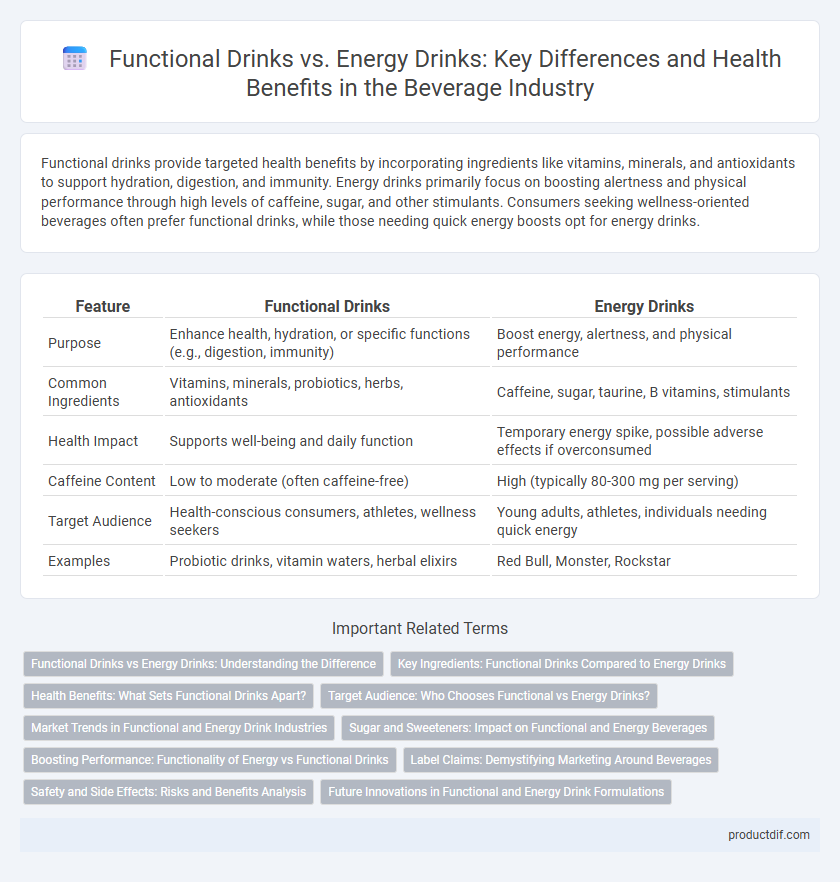Functional drinks provide targeted health benefits by incorporating ingredients like vitamins, minerals, and antioxidants to support hydration, digestion, and immunity. Energy drinks primarily focus on boosting alertness and physical performance through high levels of caffeine, sugar, and other stimulants. Consumers seeking wellness-oriented beverages often prefer functional drinks, while those needing quick energy boosts opt for energy drinks.
Table of Comparison
| Feature | Functional Drinks | Energy Drinks |
|---|---|---|
| Purpose | Enhance health, hydration, or specific functions (e.g., digestion, immunity) | Boost energy, alertness, and physical performance |
| Common Ingredients | Vitamins, minerals, probiotics, herbs, antioxidants | Caffeine, sugar, taurine, B vitamins, stimulants |
| Health Impact | Supports well-being and daily function | Temporary energy spike, possible adverse effects if overconsumed |
| Caffeine Content | Low to moderate (often caffeine-free) | High (typically 80-300 mg per serving) |
| Target Audience | Health-conscious consumers, athletes, wellness seekers | Young adults, athletes, individuals needing quick energy |
| Examples | Probiotic drinks, vitamin waters, herbal elixirs | Red Bull, Monster, Rockstar |
Functional Drinks vs Energy Drinks: Understanding the Difference
Functional drinks provide targeted health benefits such as hydration, improved digestion, and enhanced immunity through ingredients like probiotics, vitamins, and antioxidants. Energy drinks primarily focus on boosting alertness and physical performance using stimulants like caffeine, taurine, and sugar. Understanding the difference helps consumers choose beverages that align with their specific wellness or energy needs.
Key Ingredients: Functional Drinks Compared to Energy Drinks
Functional drinks typically contain vitamins, minerals, electrolytes, and botanicals like ginseng or turmeric, designed to support hydration, cognitive function, or immune health. Energy drinks primarily include high levels of caffeine, taurine, sugar, and B vitamins aimed at boosting alertness and physical energy. The key distinction lies in functional drinks offering targeted health benefits, while energy drinks focus on immediate stimulant effects.
Health Benefits: What Sets Functional Drinks Apart?
Functional drinks offer targeted health benefits by incorporating ingredients like vitamins, minerals, probiotics, and antioxidants that support hydration, digestion, and immune function, distinguishing them from energy drinks that primarily rely on high caffeine and sugar content for a temporary energy boost. Unlike energy drinks, which may lead to jitteriness or energy crashes, functional drinks promote sustained wellness by improving bodily functions without excessive stimulants. Scientific studies highlight that regular consumption of functional beverages can aid in reducing inflammation and enhancing mental clarity, making them a healthier choice for long-term consumption.
Target Audience: Who Chooses Functional vs Energy Drinks?
Functional drinks appeal primarily to health-conscious consumers seeking benefits like enhanced hydration, improved digestion, or added vitamins, often favored by fitness enthusiasts and wellness-focused individuals. Energy drinks attract younger adults and professionals needing quick boosts in alertness and stamina, especially in high-stress or demanding environments. Market analysis shows functional drinks have a strong following among ages 25-45, while energy drinks dominate the 18-34 demographic.
Market Trends in Functional and Energy Drink Industries
The functional drinks market is experiencing robust growth, driven by increasing consumer demand for health-enhancing ingredients such as probiotics, vitamins, and adaptogens. Energy drinks continue to dominate sales with a focus on high caffeine content and sugar-free formulations, catering to younger demographics seeking performance boosts. Market analytics project the functional beverage segment to outpace energy drinks in growth rate due to rising wellness trends and diversified product innovations.
Sugar and Sweeteners: Impact on Functional and Energy Beverages
Functional drinks often use natural sweeteners like stevia or agave to enhance health benefits while minimizing sugar content, appealing to consumers seeking wellness. Energy drinks typically contain higher levels of sugar and synthetic sweeteners such as sucralose, which provide quick energy boosts but may contribute to health concerns like insulin spikes and increased calorie intake. The choice of sweeteners significantly affects the nutritional profile and consumer perception, with functional drinks trending toward cleaner labels and sustainable ingredients.
Boosting Performance: Functionality of Energy vs Functional Drinks
Energy drinks primarily boost performance by rapidly increasing alertness and physical stamina through high caffeine and sugar content, targeting immediate energy spikes. Functional drinks focus on sustained performance enhancement by incorporating ingredients like vitamins, minerals, adaptogens, and electrolytes that support long-term hydration, cognitive function, and recovery. The choice between energy and functional drinks depends on the need for quick energy versus prolonged wellness and mental clarity during physical or cognitive tasks.
Label Claims: Demystifying Marketing Around Beverages
Functional drinks promote health benefits such as improved digestion, enhanced immunity, or mental clarity through ingredients like probiotics, vitamins, and antioxidants. Energy drinks claim to boost alertness and physical performance using high caffeine content, taurine, and B vitamins, often accompanied by bold marketing emphasizing quick energy spikes. Understanding label claims involves scrutinizing ingredient lists and scientific support to distinguish between genuine health benefits in functional drinks and short-term stimulation effects offered by energy drinks.
Safety and Side Effects: Risks and Benefits Analysis
Functional drinks often contain vitamins, minerals, and natural extracts designed to support hydration and health without excessive stimulants, making them generally safer with fewer side effects than energy drinks. Energy drinks typically include high levels of caffeine and sugar, increasing risks of heart palpitations, anxiety, and sleep disturbances when consumed excessively. Understanding ingredients and consumption limits is crucial for minimizing adverse effects while leveraging the cognitive and physical performance benefits these beverages offer.
Future Innovations in Functional and Energy Drink Formulations
Future innovations in functional and energy drink formulations focus on enhancing health benefits through natural ingredients like adaptogens, nootropics, and plant-based extracts that support cognitive function, immunity, and sustained energy without the crash. Advances in biotechnology enable tailored nutrient delivery systems and personalized beverage experiences based on genetic and lifestyle data. Sustainable sourcing and eco-friendly packaging are driving formulation strategies, aligning with consumer demand for clean-label and ethical products.
Functional Drinks vs Energy Drinks Infographic

 productdif.com
productdif.com